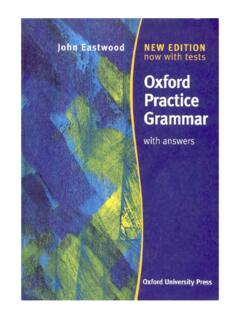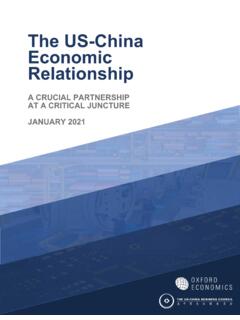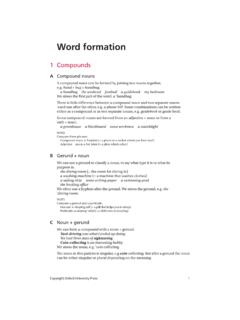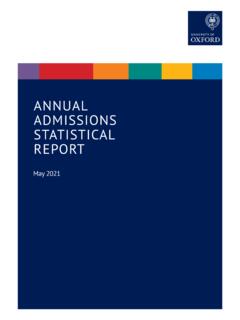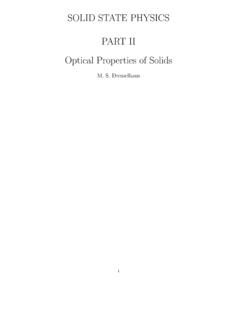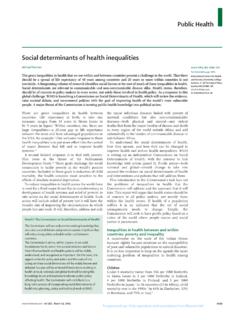Transcription of The Concise Oxford Dictionary of Literary Terms
1 The ConciseOxford Dictionary ofLiterary TermsCHRIS BALDICKOXFORD UNIVERSITY PRESSOXFORD PAPERBACK REFERENCEThe Concise Oxford Dictionary ofLiterary TermsChris Baldick is Professor of English at Goldsmiths'College, University of London. He edited The OxfordBook of Gothic Tales (1992), and is the author of InFrankenstein's Shadow (1987), Criticism and LiteraryTheory 1890 to the Present (1996), and other works ofliterary history. He has edited, with Rob Morrison,Tales of Terror from Blackwood's Magazine, and TheVampyre and Other Tales of the Macabre, and haswritten an introduction to Charles Maturin'sMelmoth the Wanderer (all available in the OxfordWorld's Classics series).OxfordPaperbackReferenceThe most authoritative and up-to-date referencebooks for both students and the general Literary TermsABC of Music Local and Family HistoryAccounting London Place Names*Archaeology* MathematicsArchitecture MedicalArt and Artists MedicinesArt Terms * Modern Design*Astronomy Modern QuotationsBetter Wordpower Modern SlangBible MusicBiology NursingBuddhism* OperaBusiness Paperback EncyclopediaCard Games PhilosophyChemistry PhysicsChristian Church Plant-LoreClassical
2 Literature Plant SciencesClassical Mythology* Political BiographyColour Medical Political QuotationsComputing PoliticsDance* PopesDates ProverbsEarth Sciences Psychology*Ecology QuotationsEconomics Sailing TermsEngineering* SaintsEnglish Etymology ScienceEnglish Folklore* ScientistsEnglish Grammar ShakespeareEnglish Language Ships and the SeaEnglish Literature SociologyEnglish Place-Names Statistics*Euphemisms SuperstitionsFilm* Synonyms and AntonymsFinance and Banking TheatreFirst Names Twentieth-Century ArtFood and Nutrition Twentieth-Century PoetryForeign Words and Phrases Twentieth-Century WorldFowler's Modern English HistoryUsage Weather FactsGeography Who's Who in OperaHandbook of the World Who's Who in the ClassicalHumorous Quotations WorldIdioms Who's Who in theIrish Literature Twentieth CenturyJewish Religion World HistoryKings and Queens of World MythologyBritain* World ReligionsKing's English Writers' DictionaryLaw ZoologyLinguisticsLiterary Quotations *forthcomingThe ConciseOxford Dictionary ofLiteraryTermsCHRIS BALDICKOXFORDUNIVERSITY
3 PRESSOXFORDUNIVERSITY PRESSG reat Clarendon Street, Oxford ox2 6 DPOxford University Press is a department of the University of furthers the University's objective of excellence in research, scholarship,and education by publishing worldwide inOxford New YorkAthens Auckland Bangkok Bogota Buenos Aires Cape TownChennai Dar es Salaam Delhi Florence Hong Kong Istanbul KarachiKolkata Kuala Lumpur Madrid Melbourne Mexico City MumbaiNairobi Paris Sao Paulo Singapore Taipei Tokyo Toronto Warsawwith associated companies in Berlin IbadanOxford is a registered trade mark of Oxford University Pressin the UK and in certain other countriesPublished in the United Statesby Oxford University Press Inc., New York(C) Chris Baldick 2001 The moral rights of the author have been assertedDatabase right Oxford University Press (maker)First published 1990 First issued as an Oxford University Press paperback 1991 Reissued in new covers 1996 Second edition published 2001 All rights reserved.
4 No part of this publication may be reproduced,stored in a retrieval system, or transmitted, in any form or by any means, withoutthe prior permission in writing of Oxford University Press,or as expressly permitted by law, or under Terms agreed with the appropriatereprographics rights organization. Enquiries concerning reproductionoutside the scope of the above should be sent to the Rights Department, Oxford University Press, at the address aboveYou must not circulate this book in any other binding or coverand you must impose the same condition on any acquirerBritish Library Cataloguing in Publication DataData availableLibrary of Congress Cataloging in Publication DataData availableISBN 0-19-280118-X13579108642 Typeset in Swift and Frutiger by Kolam Information Services Pvt. Ltd, Pondicherry, IndiaPrinted in Great Britain byCox & Wyman Ltd., Reading, EnglandFor Steve, and Oriel JaneThis page intentionally left blank PrefaceThis is a book of hard words alphabetically arranged and brieflyexplained.
5 It cannot purport to fulfil the functions of a balancedexpository guide to Literary criticism or Literary concepts, nor does itattempt to catalogue the entire body of Literary Terms in use. It offersinstead to clarify those thousand Terms that are most likely to cause thestudent or general reader some doubt or bafflement in the context ofliterary criticism and other discussion of Literary works. Rather thaninclude for the sake of encyclopaedic completeness all the most commonterms found in Literary discussion, I have set aside several that I havejudged to be sufficiently well understood in common speech (anagram,biography, cliche and many more), or virtually self-explanatory (detectivestory, psychological criticism), along with a broad category of generalconcepts such as art, belief, culture, etc., which may appear as Literary -critical problems but which are not specifically Literary Terms . This policyhas allowed space for the inclusion of many Terms generated by thegrowth of academic Literary theory in recent years, and for adequateattention to the terminology of classical rhetoric, now increasinglyrevived.
6 Along with these will be found hundreds of Terms from literarycriticism, Literary history, prosody, and drama. The selection is weightedtowards literature and criticism in English, but there are many termstaken from other languages, and many more associated primarily withother literatures. Many of the Terms that I have omitted from thisdictionary are covered by larger or more specialist works; a brief guide tothese appears on page each entry I have attempted to explain succinctly how the term is orhas been used, with a brief illustrative example wherever possible, andto clarify any relevant distinctions of sense. Related Terms are indicatedby cross-reference, using an asterisk (*) before a term explainedelsewhere in the Dictionary , or the instruction see. I have chosen not togive much space to questions of etymology, and to discuss a term's originonly when this seems genuinely necessary to clarify its current sense. Myattention has been devoted more to helping readers to use the termsconfidently for themselves.
7 To this end I have displayed the plural forms,adjectival forms, and other derived words relevant to each entry, andhave provided pronunciation guides for more than two hundredpotentially troublesome Terms . The simplified pronunciation systemPreface to the Second Edition viiiused, closely based on the system devised by Joyce M. Hawkins for theOxford Paperback Dictionary , offers a basic but sufficient indication of theessential features of stress-placing and vowel quality. One of itsadvantages is that it requires very little checking against thepronunciation key on page compiling this Dictionary , the principal debt I have incurred is to mypredecessors in the vexed business of Literary definition and distinction,from Aristotle to the editors of the Princeton Encyclopedia of Poetry andPoetics. If the following entries make sense, it is very often because thosewho have gone before have cleared the ground and mapped its moretreacherous sites.
8 My thanks are owed also to Joyce Hawkins and MichaelOckenden for their help with pronunciations; to Kirn Scott Walwyn ofOxford University Press for her constant encouragement; to Peter Currie,Michael Hughes, Colin Pickthall, and Hazel Richardson for their adviceon particular entries; to my students for giving me so much practice; andespecially to Harriet Barry, Pamela Jackson, and John Simons for givingup their time to scrutinize the typescript and for the valuableamendments they am grateful to David Higham Associates Limited on behalf of MurielSpark for permission to quote from The Prime of Miss Jean Brodie publishedby Macmillan Publishers to the Second EditionFor this edition I have added new entries expanding the Dictionary 'scoverage of Terms from rhetoric, theatre history, textual criticism, andother fields; and introduced further Terms that have arrived or becomemore prominent in Literary usage in the last ten years. I have alsoupdated many of the existing entries along with the appendix on generalfurther reading, and more extensively attached additionalrecommendations for further reading to several of the longer or morecomplex entries.
9 For advice on some of this additional material I amindebted to my colleagues Alcuin Blamires, Michael Bruce, Hayley Davis,and Philip a term's pronunciation may not be immediately obvious from itsspelling, a guide is provided in square brackets following the word orphrase. Words are broken up into small units, usually of one syllable. Thesyllable that is spoken with most stress in a word of two or more syllablesis shown in bold pronunciations given follow the standard speech of southernEngland. However, since this system is based on analogies rather than onprecise phonetic description, readers who use other varieties of spokenEnglish will rarely need to make any conscious adjustment to suit theirown forms of sounds represented are as follows:aaahairarawaybchdeeeeeererewewrf ghas in catas in agoas in calmas in hairas in baras in lawas in sayas in batas in chinas in dayas in bedas in takenas in meetas in beeras in heras in fewas in pureas in fatas in getas in hatiIIjk1mnngnko6ohoioooororowPras in pinas in pencilas in eyeas in jamas in kindas in legas in manas in notas in sing, fingeras in thankas in topas in lemonas in mostas in joinas in soonas in pooras in foras in cowas in penas in reds as in sitsh as in shopt as in topth as in thinth as in thisu as in cupu as in focusuu as in bookv os in voicew as in willy as in yesor when preceded bya consonant = I as incry, realizeyoo as in unityoor as in Europeyr as in firez as in zebrazh as in visionThe raised n (n) is used to indicate the nasalizing of the preceding vowelsound in some French words, as in baton or in Chopin.
10 In several Frenchwords no syllable is marked for stress, the distribution of stress beingmore even than in xA consonant is sometimes doubled, especially to help show that thevowel before it is short, or when without this the combination of lettersmight suggest a wrong pronunciation through looking misleadingly likea familiar , the, a term derived from the *EXISTENTIALISM of AlbertCamus, and often applied to the modern sense of humanpurposelessness in a universe without meaning or value. Many 20th-century writers of prose fiction have stressed the absurd nature ofhuman existence: notable instances are the novels and stories of FranzKafka, in which the characters face alarmingly incomprehensiblepredicaments. The critic Martin Esslin coined the phrase theatre of theabsurd in 1961 to refer to a number of dramatists of the 1950s (led bySamuel Beckett and Eugene lonesco) whose works evoke the absurd byabandoning logical form, character, and dialogue together with realisticillusion.
